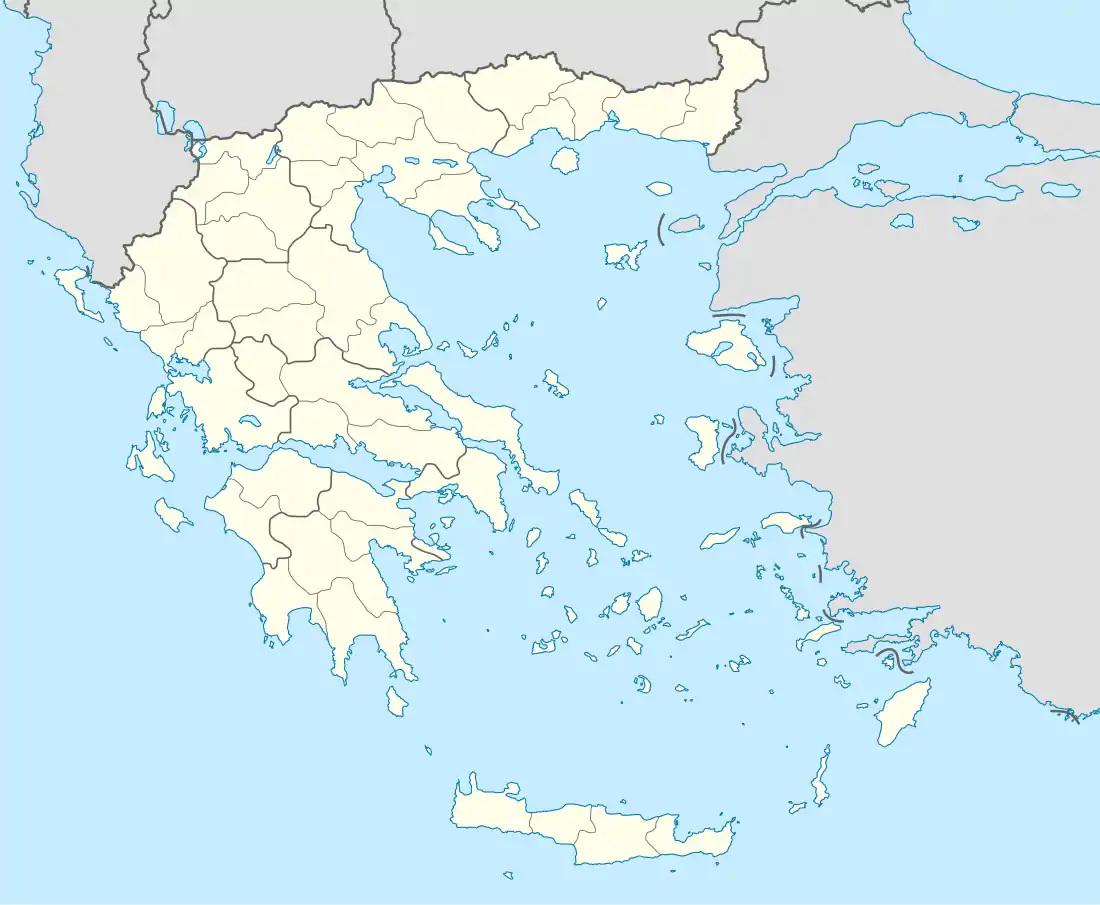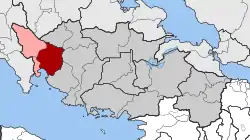Distomo
Distomo (Greek: Δίστομο) is a town in western Boeotia, Greece. Since the 2011 local government reform it is part of the municipality Distomo-Arachova-Antikyra, of which it is the seat and a municipal unit.[2] The municipal unit has an area of 131.270 km2, the community 80.498 km2.[3] Population 3,881 (2011). Distomo is situated in the western foothills of Mount Helicon, at about 450 m elevation. It is 5 km north of the Gulf of Corinth coast, 9 km southeast of Arachova, 12 km east of Desfina, 16 km southeast of Delphi, 18 km west of Livadeia and 105 km northwest of Athens. The Greek National Road 48 (Naupactus - Arachova - Livadeia) passes north of the town.
- "Distomo" may also refer to a work by Federico García Lorca
Distomo
Δίστομο | |
|---|---|
 | |
 Seal | |
 Distomo Location within the regional unit  | |
| Coordinates: 38°26′N 22°40′E | |
| Country | Greece |
| Administrative region | Central Greece |
| Regional unit | Boeotia |
| Municipality | Distomo-Arachova-Antikyra |
| • Municipal unit | 131.27 km2 (50.68 sq mi) |
| Elevation | 218 m (715 ft) |
| Population (2011)[1] | |
| • Municipal unit | 3,881 |
| • Municipal unit density | 30/km2 (77/sq mi) |
| Community | |
| • Population | 3,192 (2011) |
| • Area (km2) | 80.498 |
| Time zone | UTC+2 (EET) |
| • Summer (DST) | UTC+3 (EEST) |
| Vehicle registration | ΒΙ |
| Website | http://www.daa.gov.gr |
Distomo is known as the site of the Distomo massacre that was perpetrated by the German army against the local inhabitants during the Second World War.
One of the most important monuments of Byzantine architecture and a UNESCO world heritage site, the monastery of Hosios Loukas is situated close to Distomo.
Aluminium of Greece has its production facilities in the coastal village Agios Nikolaos. Other industries include agriculture and services.
Subdivisions
The municipal unit Distomo is subdivided into the following communities (constituent villages in brackets):
- Distomo (Distomo, Agios Nikolaos, Paralia Distomou)
- Steiri (Steiri, Hosios Loukas monastery)
Population
| Year | Village population | Community population | Municipal unit population |
|---|---|---|---|
| 1981 | - | - | 5,604 |
| 1991 | 2,156 | - | - |
| 2001 | 2,048 | 3,350 | 4,368 |
| 2011 | 1,589 | 3,192 | 3,881 |
History

On 10 June 1944, Distomo was the site of a massacre of civilians[4] by the Germans, which constituted a war crime. The massacre was meant as "retribution" for the previous death of three Germans at the hands of local guerrillas, even though the villagers had no relation to the guerrillas.
The 4th SS Polizei Division perpetrated grave crimes with superiors encouraging the soldiers. Among them ripping out the intestines of a baby and splattering them on a close relative.
Decades later, a Greek court awarded restitution to Greek victims, but the German government pressed Greece politically to nullify that decision.
To enforce the decision by the Greek court, this case was brought before an Italian court, Greece being unwilling to enforce their own decisions. The judges awarded the plaintiffs the Villa Vigoni in Menaggio, Italy, a German government-sponsored nonprofit foundation. The German government appealed a decision by the Italian supreme civil court for restitutions at the International Court of Justice, claiming for State immunity.
References
- "Απογραφή Πληθυσμού - Κατοικιών 2011. ΜΟΝΙΜΟΣ Πληθυσμός" (in Greek). Hellenic Statistical Authority.
- Kallikratis law Greece Ministry of Interior (in Greek)
- "Population & housing census 2001 (incl. area and average elevation)" (PDF) (in Greek). National Statistical Service of Greece. Archived from the original (PDF) on 2015-09-21.
- "Greece threatens to seize German property as compensation". BBC News.
External links
| Wikimedia Commons has media related to Distomo. |